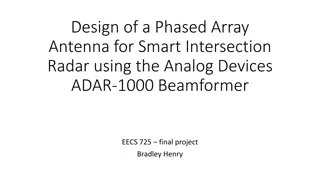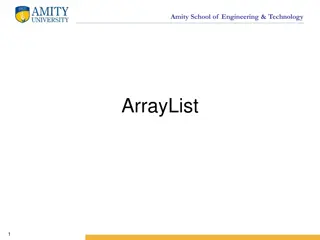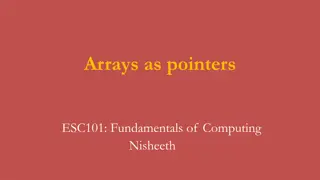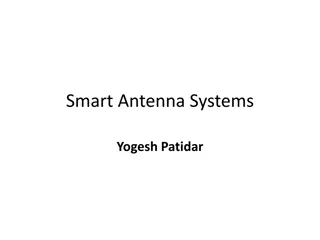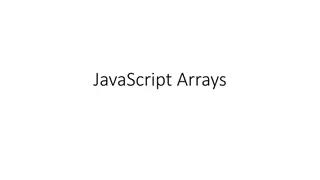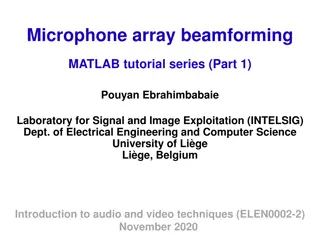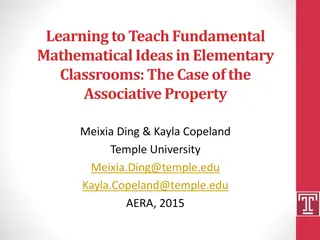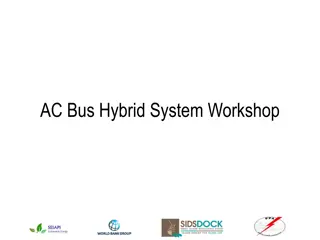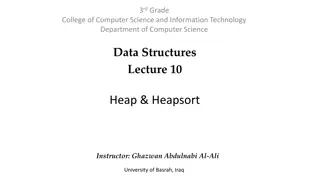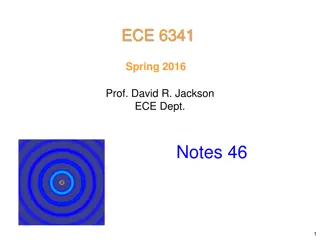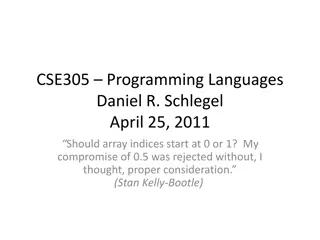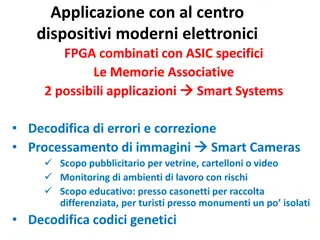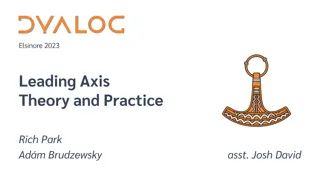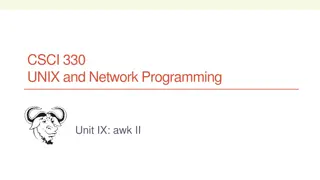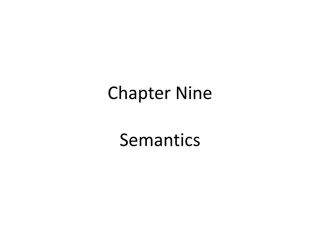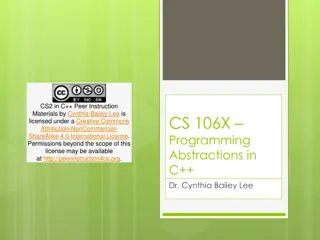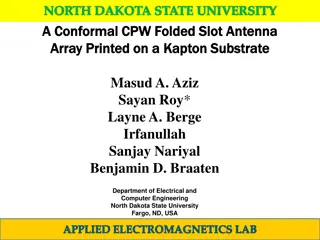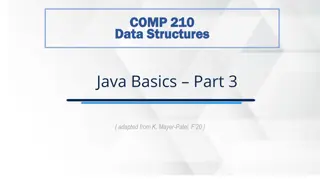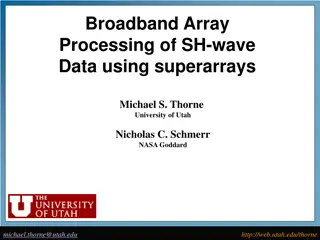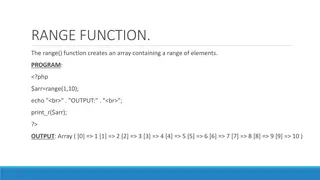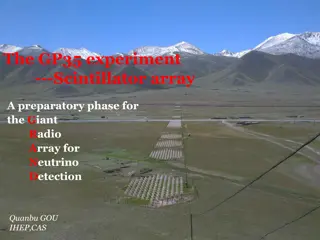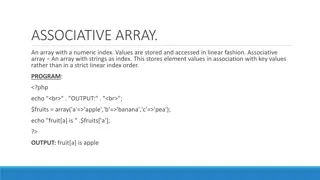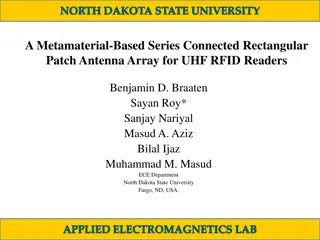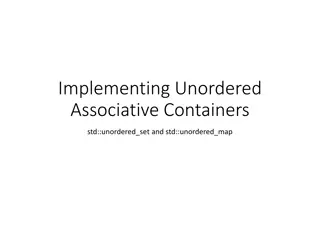The KFC menu offers a tantalizing array of fried chicken, sandwiches, sides, and beverages, embodying the essence of Southern comfort food with a global appeal
The KFC menu offers a tantalizing array of fried chicken, sandwiches, sides, and beverages, embodying the essence of Southern comfort food with a global appeal. At its core lies the iconic Original Recipe chicken, boasting a secret blend of herbs and spices that has made it a worldwide sensation. Fr
0 views • 1 slides
Phased Array Antenna Design for Smart Intersection Radar Using Analog Devices ADAR-1000
Designing a phased array antenna system for a smart intersection radar project utilizing the Analog Devices ADAR-1000 beamformer. The system involves 4 independent phased arrays covering key directions in the intersection, with considerations for beam steering, beamwidth, and array configuration. Ke
0 views • 9 slides
Implementing Minimum Number Finding Algorithm in Python
The algorithm aims to find the minimum and second minimum numbers in an array using Python. Additionally, it discusses finding the nth smallest number in an array recursively along with the running time analysis. The content includes code snippets and explanations for better understanding.
0 views • 22 slides
Java ArrayList in Amity School of Engineering & Technology
Java ArrayList in Amity School of Engineering & Technology is a dynamic array used for storing elements without a size limit. It offers flexibility by allowing element addition and removal at any time. This type of array is part of the java.util package, similar to the Vector in C++. The ArrayList c
0 views • 18 slides
Arrays as Pointers: Fundamentals of Computing
Explore the concept of using arrays as pointers in the context of computing. Learn how to create array of char pointers to store multiple strings, access elements in arrays of pointers, and understand the rules for accessing individual elements. Discover the nuances of pointer manipulation and array
1 views • 10 slides
Smart Antenna Systems Overview: Enhancing Wireless Performance
Smart antenna systems, like adaptive array antennas and switched beam antennas, combine antenna arrays with digital signal processing to transmit and receive signals adaptively. These systems improve signal quality, reduce interference, and increase capacity by dynamically adjusting radiation patter
0 views • 20 slides
Working with JavaScript Arrays: Storing and Accessing Data
Arrays in JavaScript serve as containers to hold multiple values like strings, numbers, and booleans within a single variable. They provide a more efficient way to store and manage data compared to using individual variables for each value. The guide covers creating arrays, initializing them, access
3 views • 13 slides
Theories of Human Development in Psychomotor Domain
The psychomotor domain involves the development of muscle skills associated with mental processes. Psychomotor development progresses through cognitive, associative, and autonomic stages, where individuals learn to perform new skills that involve both the body and mind. In the cognitive stage, one n
0 views • 12 slides
Pixel Array Status and Drawing Rules for High-Resistivity Epi Design
This collection of images and descriptions provides an overview of the pixel array status as of April 26, 2019, along with drawing rules for high-resistivity epi design. The pixel array features various components such as Pixel_S1, Pixel_S3, and the overall array structure. Drawing rules highlight t
4 views • 9 slides
Multiplying by 3 Numbers Lesson: Associative Property and Problem-Solving
Explore the concept of multiplying three numbers and utilizing the Associative Property of Multiplication. Understand how changing the grouping of factors doesn't affect the product. Engage in problem-solving scenarios involving multiple multiplication operations. Enhance your skills through real-wo
1 views • 20 slides
Introduction to Microphone Array Beamforming: MATLAB Tutorial Series
Explore microphone array beamforming techniques in this MATLAB tutorial series by Pouyan Ebrahimbabaie from the Laboratory for Signal and Image Exploitation at the University of Liège, Belgium. Learn about acoustic array geometry, signal processing, time-delay beamforming, and more to enhance audio
0 views • 27 slides
Unpacking the Associative Property of Multiplication in Elementary Classrooms
This study delves into how prospective teachers transform learned specialized content knowledge from professional development to elementary classrooms, focusing on the associative property of multiplication. The research explores the process of unpacking worked examples through representation uses a
1 views • 19 slides
Design Overview of AC Bus Hybrid System Workshop
This content provides a walkthrough of the design decisions involved in an AC Bus Hybrid System Workshop, focusing on the use of a generator and PV array. It covers the scenario of a village using a diesel generator, customer requirements, site information, system arrangement, and more to help under
0 views • 51 slides
APL - A Functional Language with Array Paradigms
APL, named after the book "A Programming Language Paradigms," is a functional language with a focus on array manipulation. Developed in the 1960s by Kenneth E. Iverson, it has had a significant impact on the development of spreadsheets and computer math packages. APL operates with chains of monadic
0 views • 11 slides
Progress on R&D of the WCDA Experiment
This report details the progress of the Water Cerenkov Detector Array (WCDA) experiment conducted by Mingjun Chen on behalf of the WCDA Group. It includes information on the introduction to the experiment, R&D of the Water Cerenkov Detector Unit, measurement of muon events, water quality control, pr
0 views • 47 slides
Data Structures and Heaps in Computer Science - Lecture 10 Overview
Explore the concept of heaps and heapsort in data structures, focusing on the binary heap data structure as an array object that resembles a nearly complete binary tree. Learn about binary tree representations, heap properties, and vertex assignments in a linear array to enhance search efficiency. U
1 views • 33 slides
The Array Scanning Method in Electromagnetics
Exploring the Array Scanning Method (ASM) for analyzing the field of a single source near an infinite periodic structure. The notes cover the geometry, analysis, phasing, and field calculations involved in an infinite 2D periodic array of metal patches excited by dipole sources, providing insights i
0 views • 25 slides
Array Indices: Starting at 0 or 1?
The debate over whether array indices should start at 0 or 1 continues. A compromise of 0.5 was rejected, leading to discussions on JavaScript syntax, function definitions, and iterator implementations in programming. Explore the intricacies of array indexing and programming practices.
1 views • 19 slides
Many-to-Many Relationships in Relational Databases
Exploring the intricacies of many-to-many relationships in database design through the use of associative entities. Learn why a third entity is essential, how to create relational databases with foreign keys, and the importance of identifying relationships. Dive into MySQL Workbench symbols and the
0 views • 26 slides
Innovative Applications of Associative Memory in Modern Electronic Devices
Explore the diverse applications of combining FPGA with specific ASICs and associative memories in smart systems, error decoding, image processing, advertising displays, and workplace monitoring. Learn about Content Addressable Memory (CAM) utilization, pattern matching techniques, and real-life exa
0 views • 18 slides
Leading Axis Theory and Practice in Array Kingdom 2023
Exploring the concept of Leading Axis Theory and Practice in the Array Kingdom of Elsinore 2023. The discussion covers essential keys like Rank and Dyadic Transpose, Make Functions apply to whole arrays, and Theory Arrays of various ranks. The images provide insights into major cells, leading axes,
0 views • 32 slides
Introduction to Awk: Powerful Text Processing Tool in UNIX
Awk is a versatile text processing tool in UNIX that allows users to scan files, manipulate and format data, and generate reports efficiently. With awk, users can split input lines into fields, compare them to patterns, and perform actions based on matches. This tool supports various programming con
0 views • 30 slides
Progress Update on Phased Array Feeds Project - June 2015
In June 2015, progress was reported on the Phased Array Feeds project, highlighting successful tests at the Green Bank Telescope (GBT). The collaboration included advancements in beamforming technology, backend bandwidth expansion, and instrumentation upgrades. Despite some discrepancies between mod
0 views • 14 slides
Cache Memory Designs: Set vs Fully Associative Cache
Exploring the concepts of cache memory designs through Aaron Tan's NUS Lecture #23. Covering topics such as types of cache misses, block size trade-off, set associative cache, fully associative cache, block replacement policy, and more. Dive into the nuances of cache memory optimization and understa
0 views • 42 slides
Cache Memory Organization in Computer Systems
Exploring concepts such as set-associative cache, direct-mapped cache, fully-associative cache, and replacement policies in cache memory design. Delve into topics like generality of set-associative caches, block mapping in different cache architectures, hit rates, conflicts, and eviction strategies.
0 views • 35 slides
Array Indexing and Representation
Visual guide explaining how arrays are indexed and stored in memory, including defining upper and lower bounds, determining array length, and denoting array elements. Example illustrations provided for easy comprehension of array concepts.
0 views • 124 slides
Semantics: Meaning of Words and Concepts
Semantics is the study of the meaning of words, ranging from their basic literal components to their associative connotations. This branch of linguistics focuses on objective meaning shared by all rather than subjective interpretations. Concepts like conceptual and associative meanings are explained
0 views • 22 slides
Cache Memory in Computer Systems
Explore the intricate world of cache memory in computer systems through detailed explanations of how it functions, its types, and its role in enhancing system performance. Delve into the nuances of associative memory, valid and dirty bits, as well as fully associative examples to grasp the complexit
0 views • 15 slides
MongoDB: Array Operations, Data Modeling, and NoSQL Concepts
Delve into MongoDB array operations such as accessing array elements with $slice, data modeling concepts, and the absence of joins in NoSQL systems. Learn how MongoDB handles relationships, querying nested data, and the nuances of data modeling in comparison to relational databases.
0 views • 43 slides
C++ Data Structures and Programming Concepts
Explore key programming concepts in C++, including event queues, linear and associative containers, and the implementation of the Map ADT. Learn about the usage of queues for event handling, different categories of Abstract Data Types (ADTs), and the distinction between linear and associative contai
0 views • 16 slides
SKA1 Low Assembly Integration & Verification Plan
The SKA1 Low Assembly, Integration, and Verification (AIV) Plan outlines the responsibilities of the AIV Consortium, consortium partners, and the roll-out plan for the SKA1 Low telescope. The plan encompasses user requirements validation, system verification, operational concepts, and more. It detai
0 views • 12 slides
Conformal CPW Folded Slot Antenna Array on Kapton Substrate at North Dakota State University
The study conducted at North Dakota State University involves the design and analysis of a conformal CPW folded slot antenna array printed on a Kapton substrate. The research covers topics such as introduction, background, design guidelines, and measurement results. Various parameters of the antenna
0 views • 19 slides
Basics of Java Arrays and Array Manipulation
Learn about the fundamentals of Java arrays, including initialization, literals, indexing, and the special value of null. Explore how arrays function as reference types and how array cloning can be used to create shallow copies. Understand the implications of passing arrays to methods and how change
0 views • 44 slides
Broadband Array Processing of SH-wave Data Using Superarrays
Broadband array processing of SH-wave data using superarrays at High Lava Plains (HLP) with a flexible array of 118 broadband stations deployed between 2006-2009. The processing involves transverse component displacement seismograms aligned and normalized to unity on direct-S, and Vespagrams analysi
0 views • 15 slides
PHP Array Manipulation Functions Overview
The PHP code snippets demonstrate the use of various array manipulation functions like range(), min(), max(), array_slice(), adding/removing array elements, and array_unique(). These functions allow for creating ranges of elements, finding the minimum and maximum values in an array, extracting selec
2 views • 11 slides
Array-Oriented Solutions in APL by Richard Park
Array Programming Language (APL) offers a powerful approach to problem-solving through array-oriented solutions. Richard Park delves into the intricacies of APL, highlighting its tools of thought, language primitives, and problem-solving techniques. The webinar covers the significance of notation as
0 views • 40 slides
The GP35 Experiment - Scintillator Array Preparatory Phase
Technical details of the GP35 experiment involving the assembly and testing of scintillator detectors for the Giant Radio Array for Neutrino Detection. It covers the setup, components, assembly, operation, maintenance, and test results of the detectors. Mistakes encountered during the process are hi
0 views • 13 slides
Arrays in PHP Programming
Arrays in PHP play a crucial role in storing and manipulating data efficiently. This snippet demonstrates the use of numerical and associative arrays, modifying elements, removing array elements, retrieving array size, handling nested arrays, and processing arrays with loops in PHP. Explore various
0 views • 9 slides
Metamaterial-Based Series Connected Rectangular Patch Antenna Array for UHF RFID Readers
The metamaterial-based UHF RFID reader antenna array comprises features like rectangular patches, inter-digital capacitors, tuning stub, and a series fed array. The prototype dimensions and substrate details are provided along with resonant frequency observations. Test results include S-parameters o
0 views • 15 slides
Unordered Associative Containers in C++
Explore the implementation of unordered associative containers like std
0 views • 21 slides

